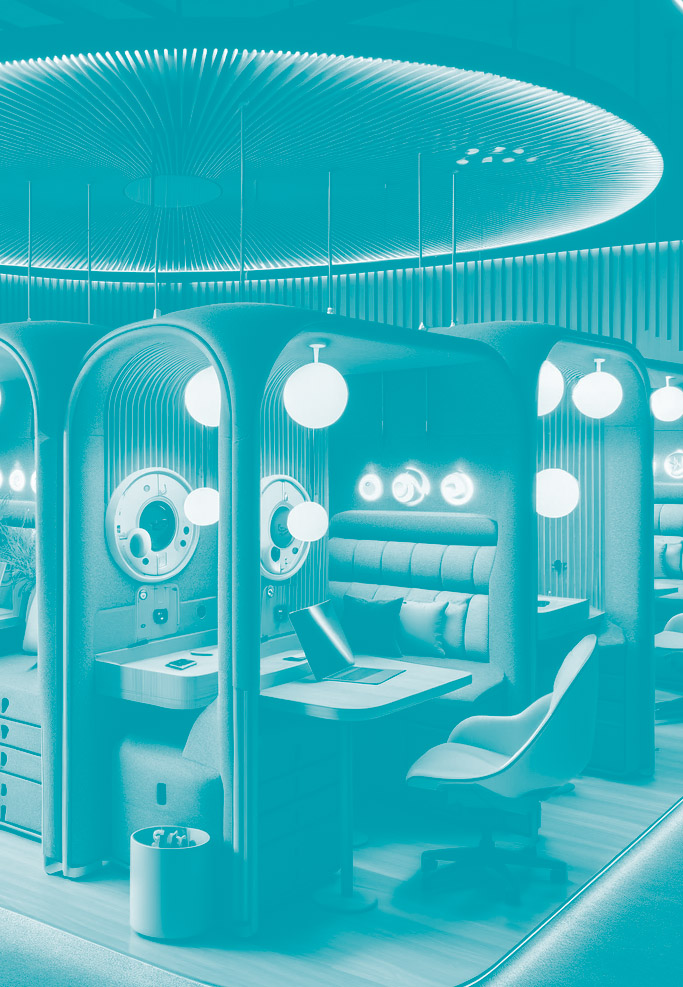Research

Reap What You Sow: Valuing Workplaces that Grow Good Ideas
- PLP Labs proposes a radical alternative to Crossrail 2, using Autonomous Electric Vehicles (AEVs).
- IUMO is twice as fast, requires half the infrastructure and cost, and runs on less than a third of the energy of Crossrail 2 trains.
- IUMO CR2 is an extension of PLP Labs’ long-running research into how AEV networks can transform our cities into safer, healthier and more sustainable environments.
IUMO (Integrated Urban Mobility) is a radically reimagined Crossrail 2, replacing conventional trains with high-speed platoons of shared Autonomous Electric Vehicles (AEVs) running in a single Crossrail tunnel. IUMO is a bold vision for the next generation of transport that has been explored in a new report developed by PLP Labs, the research and innovation arm of PLP Architecture, in partnership with Dr Panagiotis Angeloudis from the Transport Systems+Logistics Laboratory and Reed Mobility, with support of the Epic Games MegaGrant.
The Elizabeth Line, the most significant addition to London’s transport network in a generation, opened to the public on May 24th. Stretching east to west across London, it reduces journey times, increases total capacity by 10 percent, improves accessibility, and will boost the UK economy by £42 billion. It has taken more than 80 years to materialize from conception to construction. However, this is just the beginning: given the opening signifies the near completion of only the first phase (out of three) of Crossrail, PLP Labs has set out to explore how the next “once in a generation” transport achievement can be even better than the last.
Current forms of public transport like Crossrail rely on grouping people together, foregoing flexibility to achieve greater efficiencies. Conversely, private cars are extremely flexible but very inefficient and environmentally disastrous. PLP Labs has combined the best of both worlds: public and private transport, efficiency, and flexibility. IUMO means direct travel without interchanging or down time: the stop-start model of current transportation is replaced with a fluid, integrated network. Vehicles are controlled via a dynamic platoon system, allowing them to move within milliseconds of one another, traveling in a continuous flow at a steady speed without ever slowing down.
More Convenient:
IUMO is more convenient and comfortable for passengers. The on-demand service takes travelers directly to their destination when it suits them, meaning that journeys take half as long. Passengers are grouped into vehicles by destination and complete each journey from start to finish without stopping. The system also has the flexibility built into it to allow for personal safety and comfort considerations, such as for those travelling alone at night. IUMO is better placed than conventional rail to support our transport needs and transform our cities for the better. It allows us to begin reshaping our cities’ streets to create safer, cleaner, and more accessible places for all.
Less Expensive:
IUMO halves the amount of tunnel needed and allows for more efficient station infrastructure. While Crossrail 2 requires two tunnels and stations of the same length regardless of local demand, IUMO fits all travel in one tunnel and has platform sizes tailored to the stations’ individual needs, resulting in less capital investment for infrastructure. The cost for a full fleet of IUMO vehicles will also come in at half of that required for Crossrail 2.
More Sustainable:
IUMO runs on less than a third of the energy of Crossrail 2 trains. The compact nature of the system and AEVs amount to significant energy savings and less environmental impact compared to Crossrail 2. Nimble AEVs are 3.5 times more efficient and require less energy to transport passengers than traditional trains. The compact nature of the IUMO system also amounts to less construction and materials for tunnel and platform infrastructure, thus minimizing the overall environmental impact of the project.
Joyce Chan-Schoof
Joyce is a PhD Researcher at the Design School of Loughborough University. This case study is part of her doctoral field-study to develop a Valuing Biophilic Model to make a business case for human-centric design. She an Architect with two decades of experience in sustainable design; She is currently the Sustainability Lead of the UK Parliament’s Design Authority. She is passionate about bring research into practice.
Professor Derek Clements-Croome
Professor Clements-Croome is an Emeritus Professor in the School of The Built Environment at the University of Reading in Architectural Engineering research. His projects focus on the impact of wearables on office workers, and health and mental wellbeing in the workplace. Professor Derek Clements-Croome has co-authored numerous pieces reports and guidance.
Benholm Group
An industry leader, Benholm Group has become a go-to resource for planting design that pushes the boundaries of creativity thanks to an experienced team that live the company culture of being creative, having a can-do attitude, and being caring.




